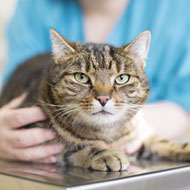Overseas vet students ‘should be exempt from immigration targets’

In 2017, nearly 22 per cent of vet students studying in the UK were not British citizens.
Veterinary organisations are urging the government not to include overseas veterinary students in the UK’s immigration targets. Failure to exempt students from the targets will increase the downward pressure on the number of qualified vets able to come to the UK from overseas, they warned.
The recommendation was made by the BVA, RCVS and Veterinary Schools Council (VSC) in a joint paper submitted to the Migration Advisory Committee (MAC).
MAC is an independent body that provides the government with advice on migration issues. Last autumn it launched a consultation calling for views on the economic and social impacts of international students.
BVA, RCVS and VSC also said that overseas veterinary students who qualify in the UK should be able to remain here to live and work after graduation. This would help to alleviate the current shortage of vets.
Furthermore, any required increase in the number of UK-national veterinary graduates must be properly funded, they added. International students currently make a disproportionate contribution to the finances of veterinary schools.
In 2017, nearly 22 per cent of vet students studying in the UK were not British citizens. Out of 1,145 non-UK students, 129 were from EU countries and 1,016 were from non-EU countries.
Whilst the number of EU students was relatively small, the joint paper pointed out that EU nationals make up 22 per cent of veterinary surgeons working in academia in the UK. Most of these perform roles that are directly linked to the provision of education and training for the undergraduate veterinary degree.
RCVS president Professor Stephen May said the paper was submitted “against the backdrop of potential staff shortages across the veterinary sector as a whole”. This will be exacerbated if the flow of EU vets into the UK is stemmed after Brexit, or if large numbers of EU citizens already in the UK decide to go elsewhere to work.
BVA president John Fishwick added: “The measures outlined in our submission aim to help maintain the necessary numbers of highly educated and skilled vets. Fulfilling the demand for vets, following the departure of the UK from the EU, will be essential to maintain animal health and welfare, public health, food safety and trade.
“Enabling overseas veterinary students who qualify in the UK to remain and continue to contribute following graduation will help alleviate a shortage of vets.”



 The Veterinary Medicines Directorate (VMD) is inviting applications from veterinary students to attend a one-week extramural studies (EMS) placement in July 2026.
The Veterinary Medicines Directorate (VMD) is inviting applications from veterinary students to attend a one-week extramural studies (EMS) placement in July 2026.